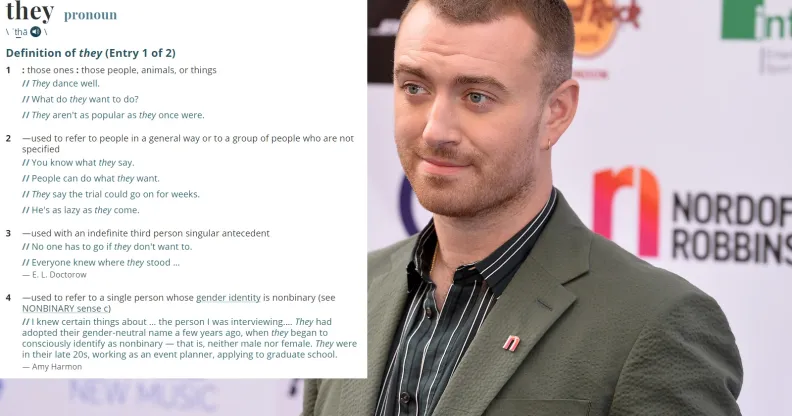Merriam-Webster dictionary adds gender-neutral ‘they’ pronoun

Merriam-Webster has become the latest dictionary to affirm the use of singular they for non-binary people (Getty)
The Merriam-Webster dictionary has recognised the use of ‘they’ as a singular gender-neutral pronoun.
The influential American English dictionary made the announcement on September 17 as it rolled out a new edition, hot on the heels of Sam Smith announcing their preference for they/them pronouns.
The new definition clarifies that “they” can be “used to refer to a single person whose gender identity is non-binary”.
Although the recognition of its use for non-binary people is new, the singular “they” has been observed in English for hundreds of years.
It is already recognised by the Oxford English Dictionary and Dictionary.com, despite anti-trans voices frequently discovering their inner grammar pedant over the issue.
Merriam-Webster: Singular ‘they’ dates back to 1300s.
Merriam-Webster explained that the move was “an expansion of a use that is sometimes called the ‘singular they'” (and one that has a long history in English).
The influential dictionary preempted the inevitable fury from the Piers Morgans of the world with a blog post that added: “We will note that they has been in consistent use as a singular pronoun since the late 1300s… [and] regardless of what detractors say, nearly everyone uses the singular they in casual conversation and often in formal writing.
“They is taking on a new use, however: as a pronoun of choice for someone who doesn’t identify as either male or female.

Merriam-Webster acknowledged that non-binary people have used ‘they’ for decades (Gender Spectrum Collection)
“This is a different use than the traditional singular they, which is used to refer to a person whose gender isn’t known or isn’t important in the context, as in the example above.
“The new use of they is direct, and it is for a person whose gender is known, but who does not identify as male or female. If I were introducing a friend who preferred to use the pronoun they, I would say, ‘This is my friend, Jay. I met them at work.'”
Non-binary people have used ‘they’ for decades.
It adds: “If you’re someone who has a binary gender (that is, who identifies as male or female) and you’ve never encountered the non-binary they before, it may feel a little weird. Or you may think it’s unnecessary.
“You may be confused by all the new terminology (though there’s help out there for you). Yet we’ve been searching for a non-binary pronoun for quite a while now.
“There have always been people who didn’t conform to an expected gender expression, or who seemed to be neither male nor female. But we’ve struggled to find the right language to describe these people—and in particular, the right pronouns.
“In the 17th century, English laws concerning inheritance sometimes referred to people who didn’t fit a gender binary using the pronoun it, which, while dehumanising, was conceived of as being the most grammatically fit answer to gendered pronouns around then.
“Adopting the already-singular they is vastly preferable. It’s not quite as newfangled as it seems: we have evidence in our files of the non-binary they dating back to 1950, and it’s likely that there are earlier uses of the non-binary pronoun they out there.”

